This article is part of the Centrical Labs series, where we publish findings from our data research team. We analyze employee performance and engagement using behavioral science and real-time data, then share the results to help you increase your team’s success. Subscribe and follow Centrical on LinkedIn to stay updated on the latest insights.
At first, it seemed too simple to be true.
While reviewing coaching data across dozens of organizations using Centrical’s platform, we noticed a pattern: when managers added deadlines to coaching tasks assigned to their team members, the completion rate jumped.
No elaborate system, no extra incentives; just a deadline.
Intrigued, we dug deeper. What we found reveals a simple but powerful way to boost your frontline team’s overall performance instantly.
Coaching: A Key Element of Performance Experience
Coaching is a core component of Centrical’s AI Performance Experience Platform, helping managers drive their teams’ performance and growth through timely, actionable guidance. Using real-time insights that automatically surface individual performance outliers, managers can easily assign coaching actions to address areas for improvement.
Coaching actions typically include clear instructions (such as completing a learning mission), a due date, and space for manager-employee communication. Employees acknowledge, complete, and follow up on coaching directly within the platform, making coaching a seamless part of everyday work rather than an extra task.
In our research, we wanted to better understand how to make coaching as effective as possible to drive significant performance improvement.
Inside Centrical Labs: Our Methodology
Before we dive into the data, here’s a quick breakdown of how Centrical Labs gathers insights.
We analyze employee engagement and performance data from our platform users (100% anonymized). This includes performance metrics, real-time feedback, learning interactions, and coaching actions captured by Centrical’s AI Performance Experience Platform. Then, we examine how different behaviors, coaching strategies, and feedback loops impact overall team success.
For this report, we analyzed data from over 50K users across several of our largest clients, including a top-3 bank, a global hotel chain, and one of the world’s leading BPOs. The goal was to discover what influences coaching effectiveness and identify scalable ways to improve it.

Introducing the General Performance Score (GPS)
Because coaching tasks are not always tied to a specific KPI, our data science team developed what we call a General Performance Score (GPS).
The GPS is a unified metric designed to measure overall employee performance, even when individual actions aren’t tied directly to a single KPI.
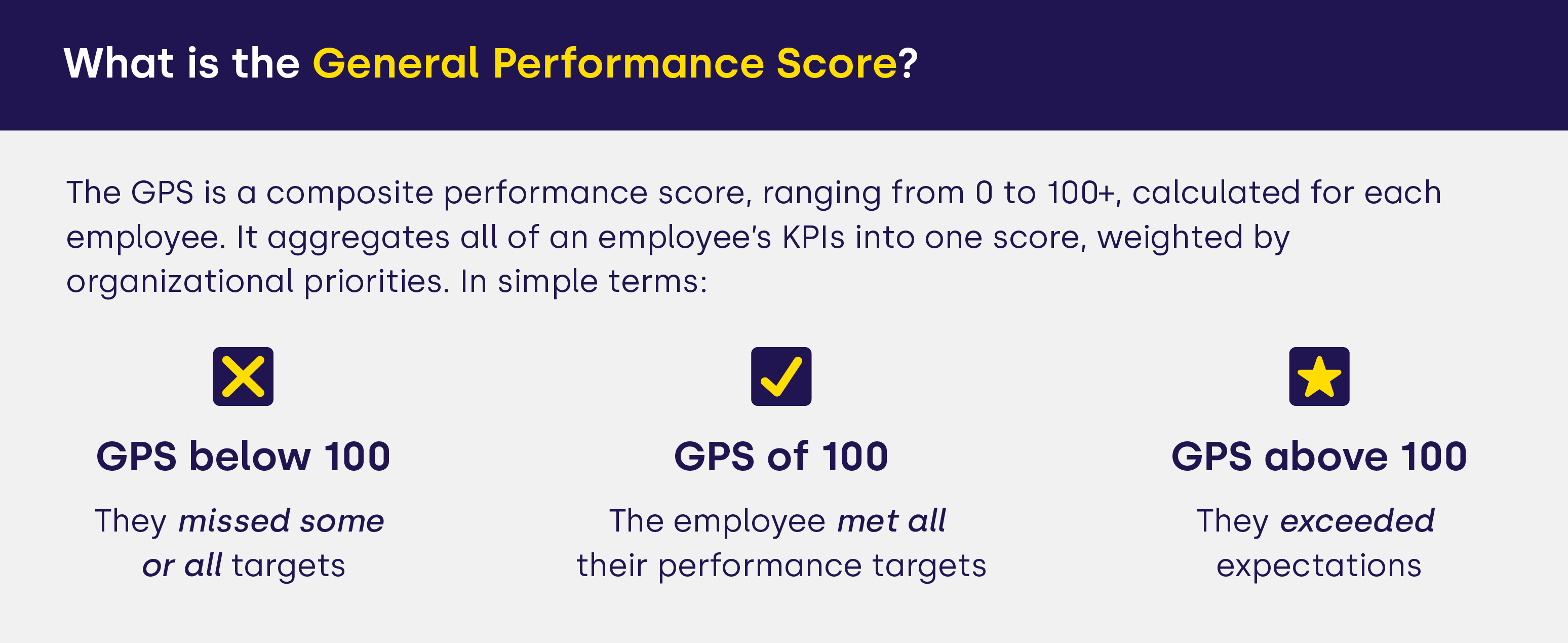 By using the GPS, we can consistently evaluate the impact of coaching, learning, and other actions. It gives us a way to see how these behaviors influence real-world performance outcomes.
By using the GPS, we can consistently evaluate the impact of coaching, learning, and other actions. It gives us a way to see how these behaviors influence real-world performance outcomes.
With GPS as our foundation, we could now ask: “Does adding a deadline to coaching tasks measurably move the needle on performance?”

The Findings: The Surprising Impact of Deadlines on Coaching Completion
Our goal was to understand how to increase the likelihood that employees complete the coaching actions assigned to them by their managers.
38% of all coaching actions are tied to a specific KPI.
Here’s what our data shows:
- On average, 72% of coaching actions assigned to users within Centrical’s platform without a due date are completed.
- When managers add a due date, the probability of completion increases by +12%.
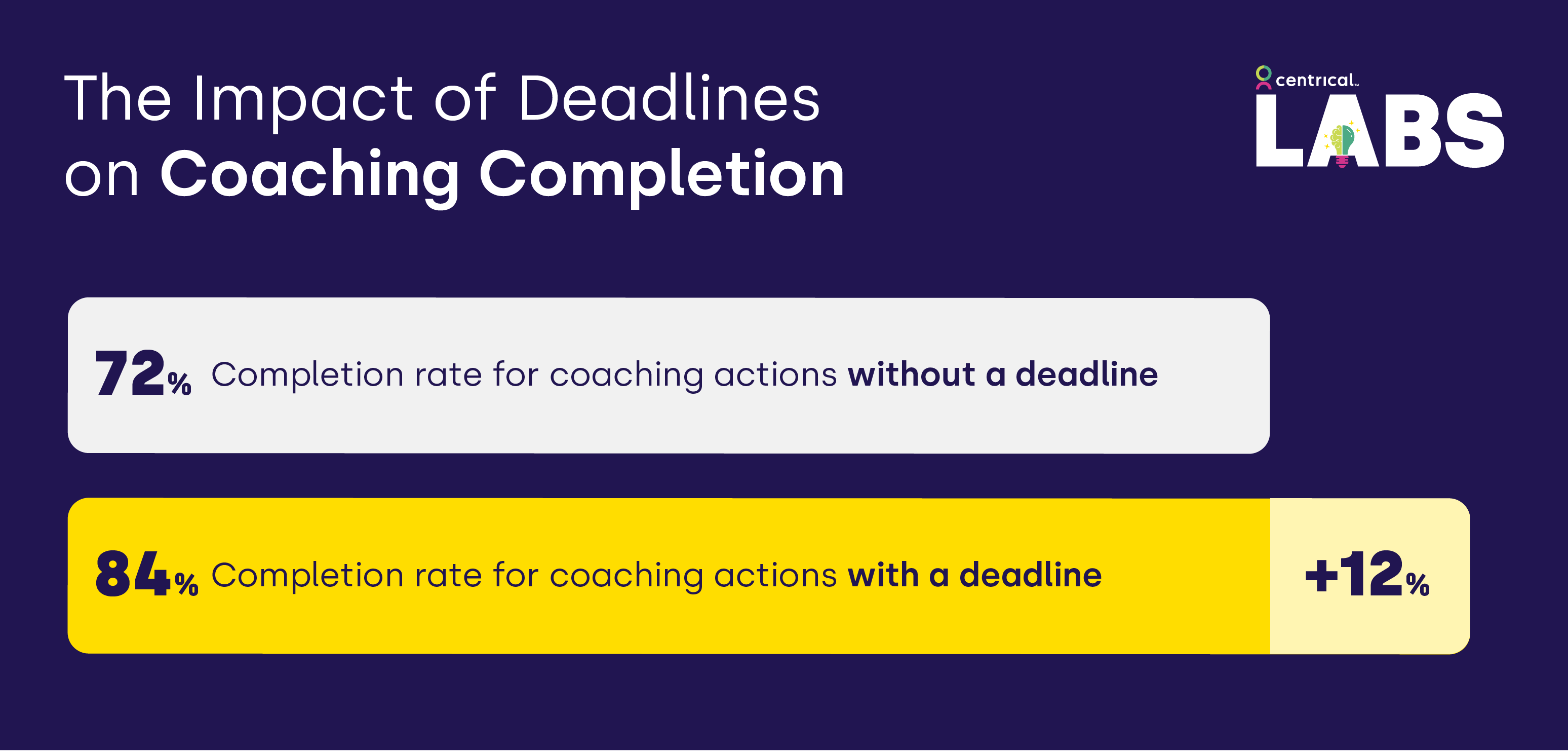 But the real question is: How do coaching actions impact employees’ actual KPI performance?
But the real question is: How do coaching actions impact employees’ actual KPI performance?
Our data shows that coaching has a significant and measurable impact on employee performance.
On average, KPIs targeted by coaching improve by 0.77 standard deviations (a result that is statistically significant with a p-value below 0.0001).
The story gets even more interesting when we look at the role of deadlines:
- When managers do not assign a due date to the coaching action, the KPI improves by 0.75 standard deviations.
- When managers include a due date in the coaching action, the KPI improves by 0.78 standard deviations.
- Simply adding a due date boosts the effectiveness of coaching by +4%.
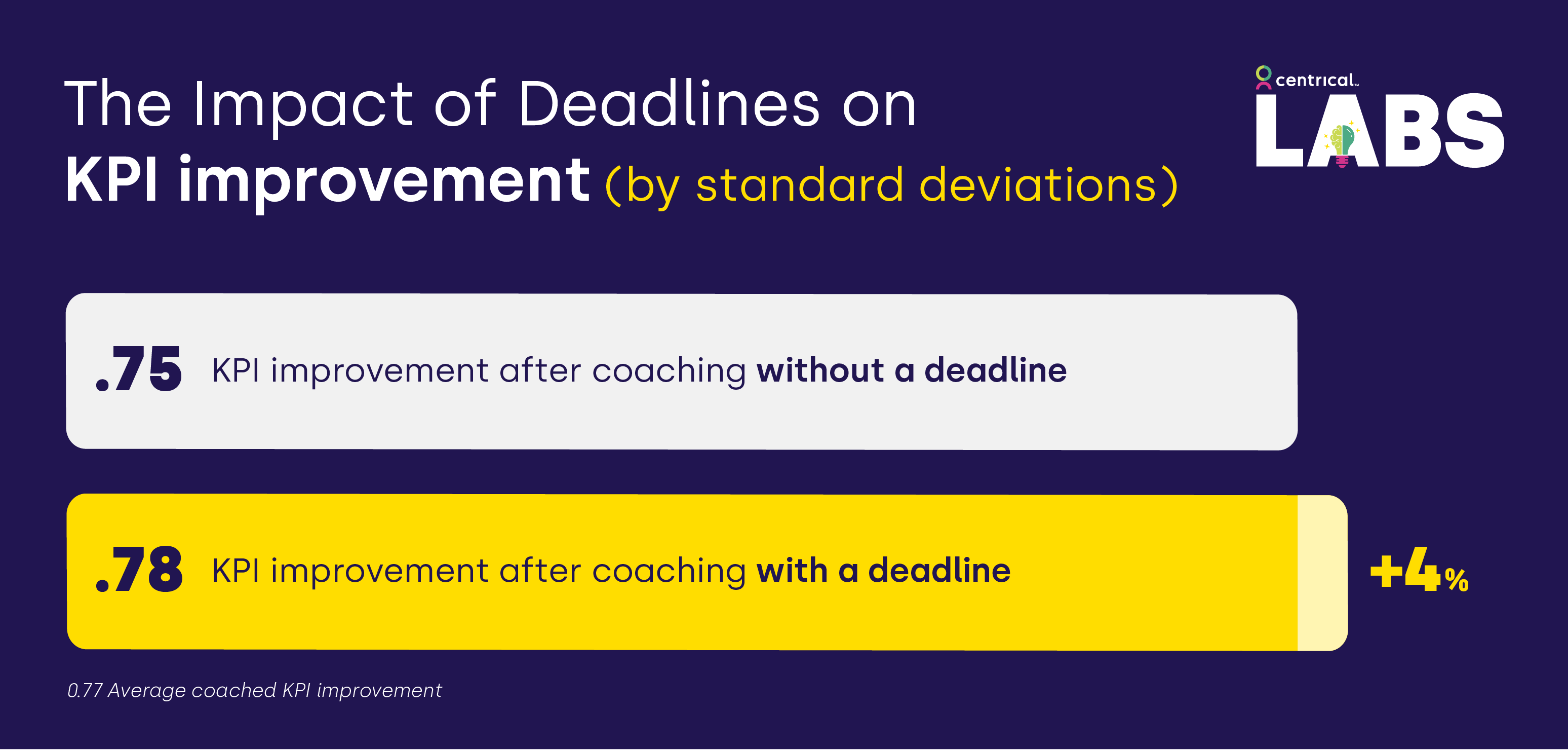
Finally, we looked at how adding a due date to coaching tasks affects overall performance using the General Performance Score (GPS).
Our data shows that adding a due date to coaching tasks drives overall performance. When a due date is included, an employee’s GPS increases by 0.23 standard deviations.
Why It Matters: What This Means for Managers and Teams
A due date may seem like a minor detail. Yet, our data shows that it has a significant impact on coaching effectiveness and employee performance.
Here’s what managers and their teams should take away from our findings:
✅ Set a due date, every time: With virtually no effort, you can increase coaching task completion and boost KPI improvement.
✅ Continuous, consistent coaching drives performance: Ongoing, real-time coaching helps managers act on opportunities as they happen, not just during scheduled sessions.
✅ Timely coaching leads to better outcomes: Deadlines help translate coaching into action. When employees know what’s expected and when, they’re more likely to follow through.
How to Get Started: Simple Steps to Improve Coaching Effectiveness
Need more tips to make your coaching as effective as possible?
We’ve put together an AI Coaching Prompting Toolkit for contact center and sales leaders, which you can download here:

Engage and motivate your frontline teams
Improve performance with an AI-powered digital coach
Deliver world class CX with dynamic, actionable quality evaluations
Boost performance with personalized, actionable goals
Nurture employee success with the power of AI
Listen and respond to your frontline, continuously
Drive productivity with performance-driven learning that sticks
Drive agent efficiency, deliver client results
Keep tech teams motivated and proficient on products and services while exceeding targets
Maintain compliance while building customer happiness and loyalty
Enlighten energy teams to boost engagement
Engage, develop, and retain your agents while driving better CX
Improve the employee experience for your reservations and service desk agents

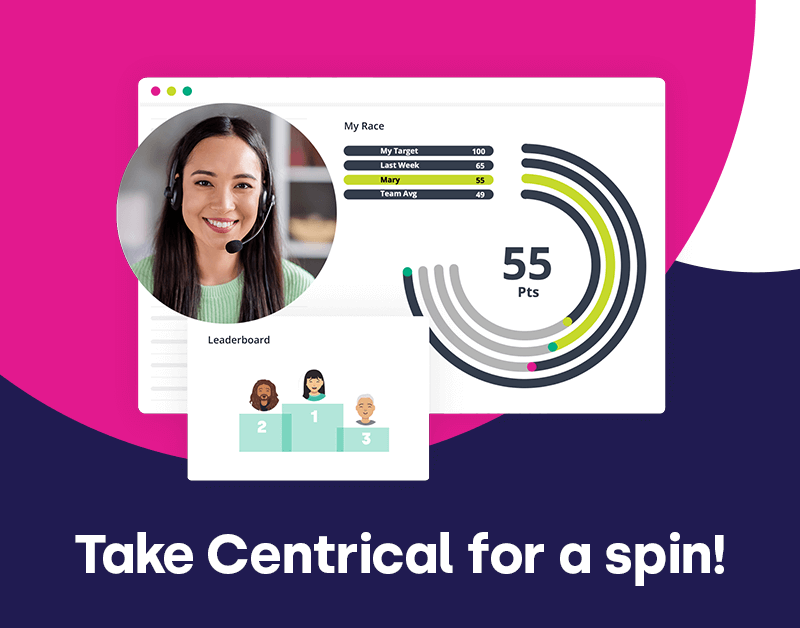







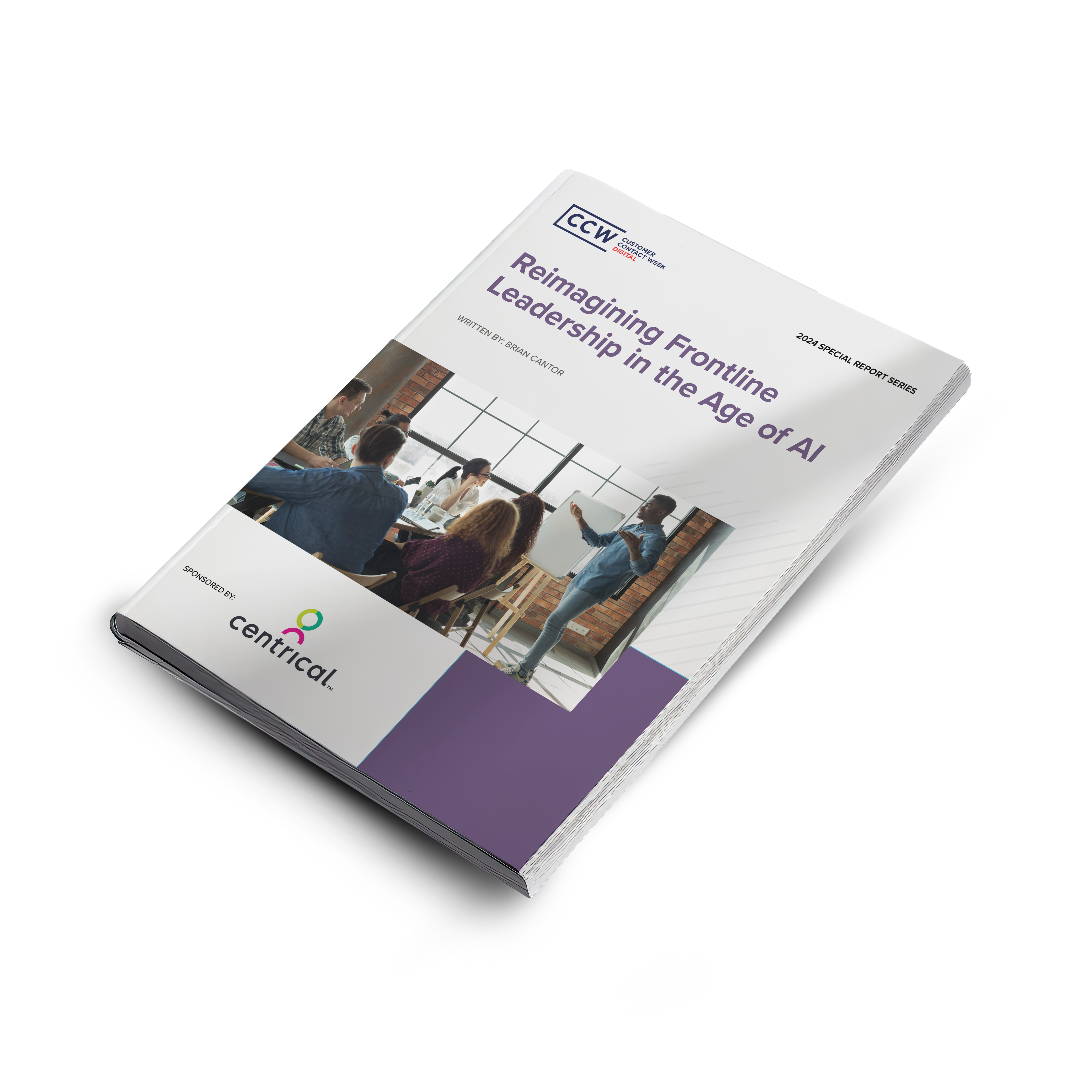
 Madeleine Freind
Madeleine Freind
 Natalie Roth
Natalie Roth Linat Mart
Linat Mart












 Doron Neumann
Doron Neumann Gal Rimon
Gal Rimon Daphne Saragosti
Daphne Saragosti Ella Davidson
Ella Davidson Ariel Herman
Ariel Herman Ronen Botzer
Ronen Botzer